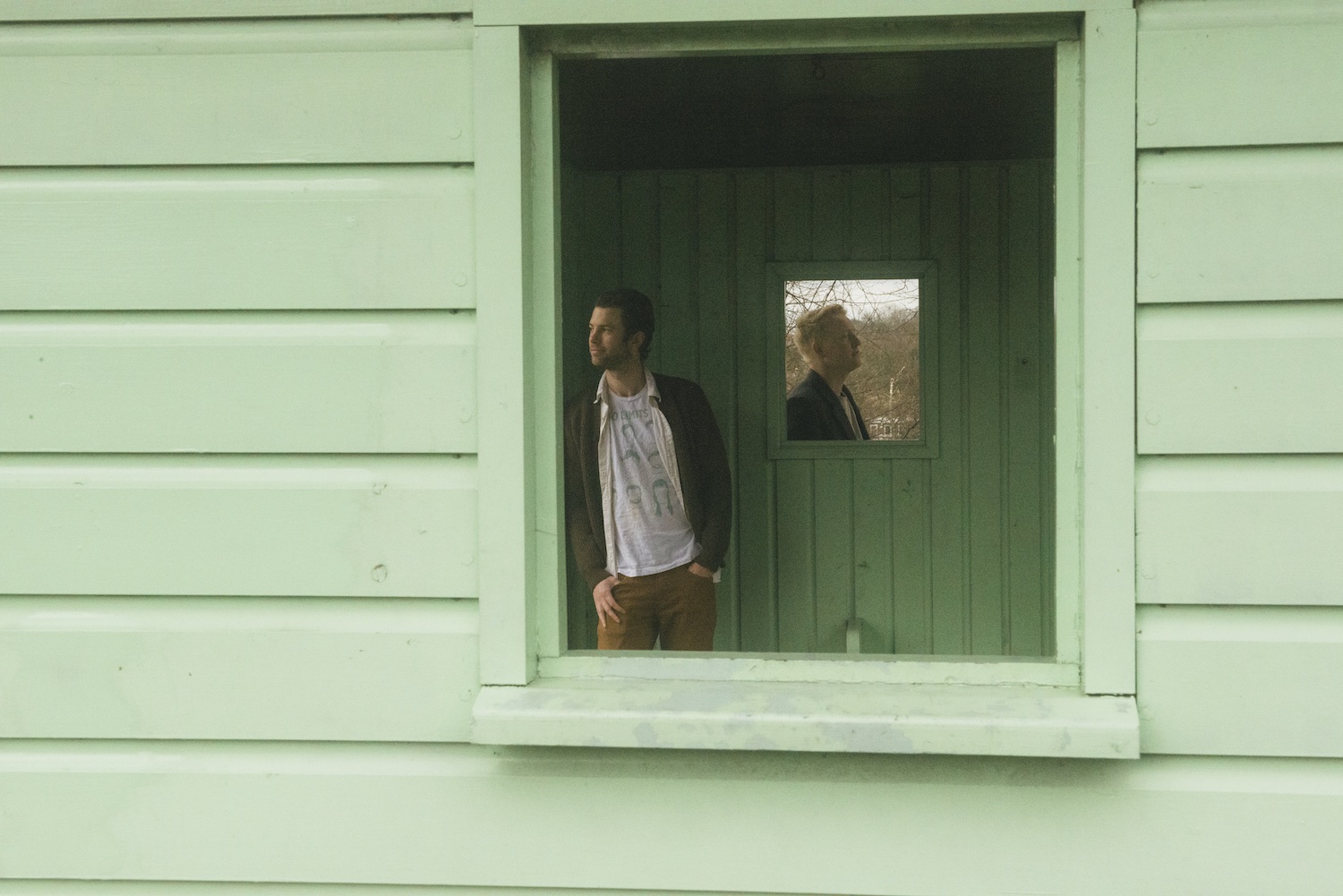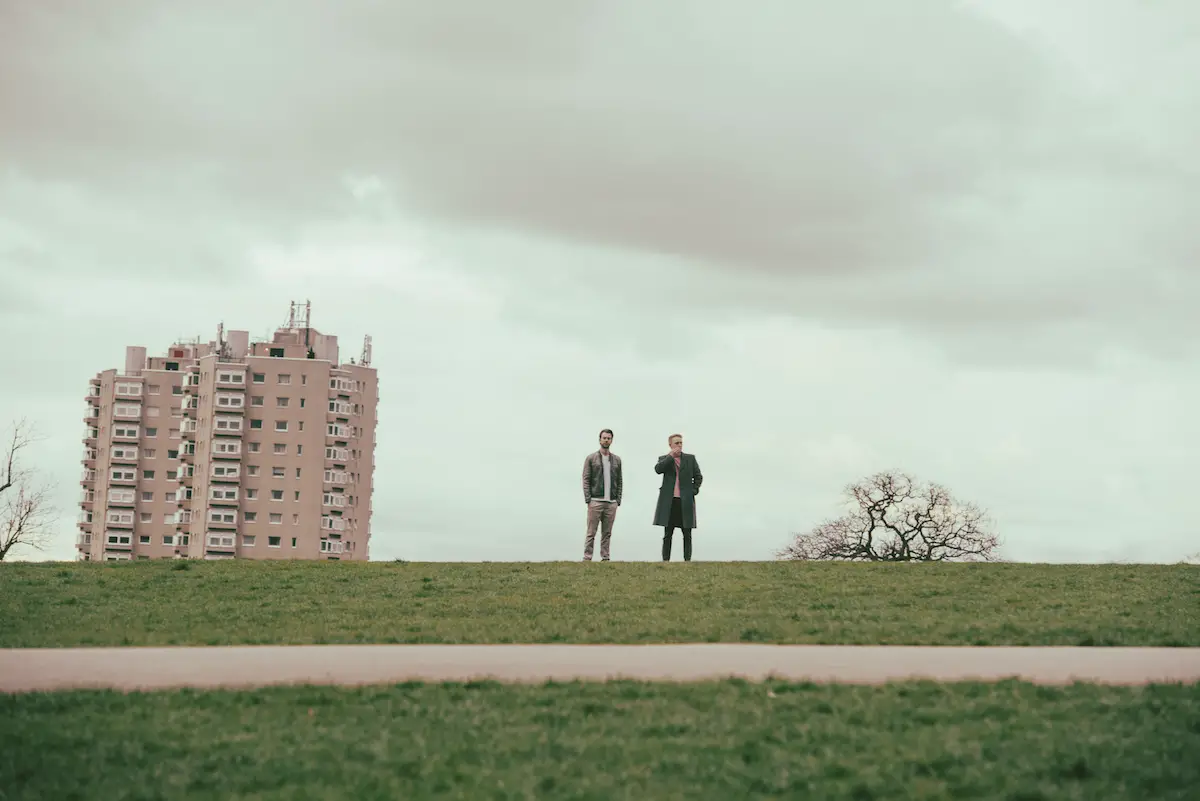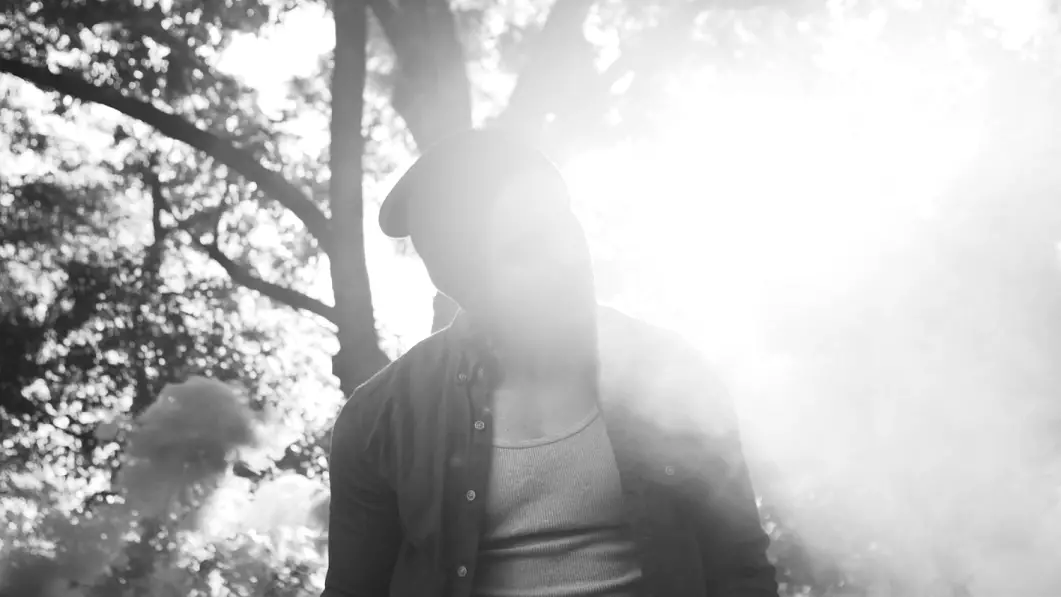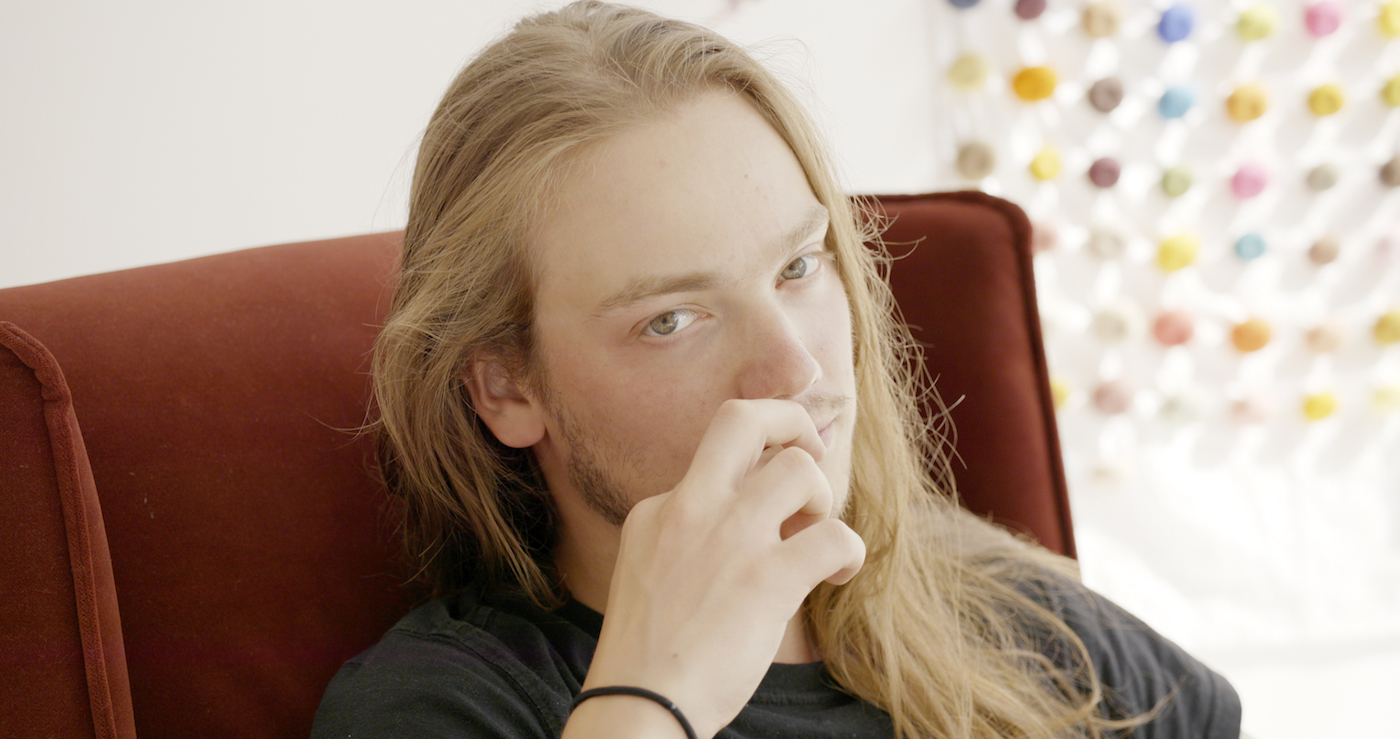Passion and pain, warmth and wonder coalesce in Arliston’s radiant ‘How in Heaven’ EP, a spirited indie pop record full of honest, intimate reflections and beautiful inner reckonings.
Stream: “How in Heaven” – Arliston
South London’s Arliston fashion themselves “specialists in sad, sad songs,” and for the past five years the duo have kept true to that promise, delivering set after set of moody and brooding tunes that fill the air with inescapably raw and intense emotion. The pair wear their hearts unapologetically on their sleeves in life as in their art, so it would surprise no one to learn that their fourth EP aches from the inside out.
But it’s not “sad,” per se.
Or put another way, there’s far more to Arliston’s latest body of work than just melancholy and somber commiseration; the new tracks are more complex, and demand a more nuanced understanding that goes well beyond the bounds of any one box. Passion and pain, warmth and wonder coalesce in Arliston’s radiant How in Heaven EP, a spirited indie pop record full of honest, intimate reflections and beautiful inner reckonings.

Held on a thin thread
Trying too hard to show
I can tie shoes on my own
I’m shrinkin’, I’m violet in truth
Thought I’d be fine
Thought I had nothing to lose
How in heaven did I walk over you?
Keeping the faith, but I can’t really get close enough
How in heaven did I walk over you?
But the songs that I like, they left you dry on the vine
Released July 14, 2023 via the band’s own label Sob Story Records, How in Heaven presents Arliston at their most expansive and their most intense, pouring their souls out through five songs that delve deep into the folds of life’s ebb and flow.
Stories of connection and disconnect, of isolation and togetherness, of love and loss, of hope and heartache blend into one rousing, tender tempest as Jack Ratcliffe (vocalist & instrumentalist) and George Hasbury (instrumentalist & producer) gently challenge their own ideas about who they are, and who their band can be. It’s exhilarating to watch a group grow into their voice in real time, and that’s exactly what How in Heaven is: An awakening.

“As a reintroduction, it hopefully shows that we’re capable of more than sad piano ballads!” Arliston tell Atwood Magazine. “It is our best work yet, it has some of the best narrative and abstract lyrics we’ve written, the most interesting production and somehow the catchiest hooks. The hope is to always improve and push boundaries, and How in Heaven does that for us – so in terms of our artistry at this point in time, it seems to us that we’re on a steady gradient upwards, long may it continue!”
Arriving only eight months after their well-received third EP Even in the Shade, How in Heaven finds the duo collaborating with producer/engineer Brett Shaw (The Foals, Florence and the Machine) to craft a cohesive, cathartic auditory experience that resonates with a warm and inviting weight.

“We had just finished our previous EP Even in the Shade and were feeling like we’d produced a really nice collection of songs there, but they were all quite small in scale,” the duo explain. “So, we started writing, almost in reaction to that work. Programming in beats and using big synth sounds to create a more expansive record, we couldn’t entirely get away from the guitars and piano lines that are so often the backbone of Arliston songs, but it has landed us in quite a nice place creatively and we seem to have grown into and found our own sound.”
“Both of us are really into the slightly weirder productions that either combine unexpected elements or have unusual accents, something going on that is fundamentally different or at least not as commonly heard,” Ratcliffe reflects.
“I suppose that’s a subconscious attempt to stand out by offering something immediately odd at its core. In terms of vision, it’s not like we had a specific image in our heads and went out and made that, it was definitely a more organic growth, being led by each song rather than attempting to bend it to a vision. But there were certainly unexpected elements, like in ‘451’ where we used a chopped jazzy sax or the glorious Juno line in ‘Backwards,’ that came out of seemingly nowhere and became the most important element really shaping the song as a whole.”

Arliston got away from the strictly “sad songs” label by delving deeper into broader topics and themes, but their music is just as turbulent, as raw, and as evocative as ever.
Their vibrant balladry, brought to life through a colorful mix of soaring, harmony-drenched vocals, pianos, guitars, drums, and synths, recalls the likes of fellow London’s Aquilo, Seattle’s SYML, Australia’s Vancouver Sleep Clinic, Wales’ Novo Amor, and Massachusetts’ Haux – artist who have all, at one time or another, helped our spirits soar while tears streamed down our faces in spades.
“This EP as a whole is focused on the theme of isolation,” Ratcliffe explains. “Whether it’s the prosaic loneliness of Montag in Fahrenheit 451, the separation of two people in ‘How in Heaven,’ or just the more relatable ‘I don’t know what to say next’ feeling at a party… If nothing else, this EP has revealed (to me at least) that I’m exceptionally depressing.”
“I feel like this is our most musically mature body of work to date,” he adds. “I’m very proud of it. We’ve really zeroed in on the ‘Arliston’ sound and have been lucky to find a bunch of like-minded (and amazingly talented) musicians who can transform our modest ideas into a three-dimensional world.”

The EP’s title is a nod not only to the song of the same name, but also to the vast depths of rumination opened up by those three words.
“After we found the cover art, we felt it fit so well that it should be the title for the whole EP,” Ratcliffe laughs. “How in heaven DID those goats get up there?”
“Also, it’s a phrase from something I remember reading (title and author lost to the mists of time unfortunately), which asked how things work in Heaven. Do you still have unrequited love, for instance? In which case, does that mean half of every couple is going out with someone they aren’t attracted to? How about unkindness, are people’s feelings never hurt? In which case are you unable express yourself freely and fully? The conclusion being that, even a perfect, idealised environment like Heaven is deeply problematic, and that it provides (unusually for Arliston) a moment of positive reflection on normal, everyday, flawed life. A perfect world would be a prison, imperfection is the best we can hope for.”

Highlights abound from end to beautiful end as How in Heaven dazzles the ears and enchants the heart for nineteen gorgeously gut-wrenching minutes. The opener (and title track) “How in Heaven” sets the scene, with a soft, bittersweet touch and lush soundscape immersing audiences in a world full of nostalgia and evocative emotional turmoil. “This one is a classic ‘you don’t know what you’ve got until it’s gone’ song,” Ratcliffe explains. “I guess there’s a reason the topic has been covered so many times, it’s a universal truth! It’s so easy to take people close to you for granted. It’s only when you walk away and get some perspective (and maybe a little rose-tinted pondering) that you are able to see the full picture.” He holds nothing back in song’s verses and chorus, singing:
Held on a thin thread, you said
“Some things just stay the same”
I’m always hoping they change
You could listen to dentists at dinners for hours
With your best cruise ship smile and a warm whiskey sour
While you were barely awake
How in heaven did I walk over you?
Keeping the faith, but I can’t really get close enough
How in heaven did I walk over you?
But the songs that I like, they left you dry on the vine
Thus begins a record whose charm and churn threaten to tug at every heartstring. “Bite me off another piece, honey,” Ratcliffe confesses in the seductive, soothing “451,” named after Ray Bradbury’s dystopian novel, Fahrenheit 451. “Ooh, maybe I’m a little lost, honey, honey…” His heart is open and heavy as he sings from the perspective of the book’s protagonist, Guy Montag.
That’s right: The books you read (or skimmed) in school can have a real value-add later on in life!

Later tracks like “Chasing Birds” and “Backwards” have a very specific way of inspiring, soothing, and invigorating all at once. While the latter proves a hypnotic, heavy conclusion to the EP, the former is a powerful slow-burn that rises as if from a whisper, to a visceral, emotionally charged shout.
One of the EP’s undeniable hits is “Pisco Sours,” the beautifully brooding, smoldering reverie that came out earlier this year (and quickly became an Atwood Editor’s Pick). This is Arliston at their finest, deftly weaving their way through a hushed, heartfelt landscape born from warm, distant memories and intimate, vulnerable emotions. “I am thinking it through,” Ratcliffe sings, starting the song midway through a conversation with himself. A heavy cloud seems to fall around the ears as Ratcliffe teases out feelings of distress, anxiety, and yearning. “I’m living in my head more than I live in the room,” he confesses. “I was thinking of you peeling lemons for Pisco Sours, and how I never follow through.” This is more than being lost in thought; Arliston are closer to drowning in an emotional pool of their own creation. Achingly introspective, “Pisco Sours” is a catchy, cathartic, and confessional fever dream burning bright with feeling and memories from a past we just can’t shake.
I am thinking it through
‘Cause I’m living in my head
more than I live in the room
I was thinking of you
Peeling lemons for Pisco Sours
and how I never follow through
So what do you think,
Is it too early in the evening,
Too early in the evening
To escape?
So what do you think,
Is it too early in the evening,
Too early in the evening
To escape?
All told, How in Heaven is a breathtaking experience through and through.
Arliston remain those sad boys at heart, but there’s so much more to these songs that meets the eye – to the point where it would be a disservice, at this point, to label them as “sad songs” and call it a day.
“I think coming from an EP like Even In The Shade, which was such an intimate affair, we’ve almost gone the other way and now created a collection of more expansive and larger scale songs,” George Hasbury marvels. “If you combined this EP and our previous EP, you have an album that really demonstrates Arliston’s sonic range.”
“I’ve really enjoyed the process of scratching out guide beats and handing those over to some amazing drummers and getting such great interpretations back,” he adds. “It means that How In Heaven has a really rich seam of grooves running through it. At some points it feels almost like Big Beat and on other tracks we get more of a shuffle thing going on, it’s exciting!”

One thing that’s undeniable is how confident Arliston feel as they head into the second half of the year.
They always knew where their ‘niche’ lay, but now that it’s expanding, there’s the sense that they could go anywhere; that they could do anything – maybe even right a full-throttle happy song!
But we’ll leave that for the fifth EP.
“Hopefully people appreciate the slightly weirder rhythms, maybe a desire to read the Ray Bradbury classic!” Ratcliffe says, offering his own final thoughts and takeaways. “I think the process of putting this EP out has been a great learning curve, we managed to get huge support for what is frankly the weirdest single we’ve ever released, ‘451.’ That was really affirming for us, it showed us that we do know what is good, and not to underestimate the audiences desire for unusual sad songs! We spend so long in a bubble in the studio that we start to question ourselves but the reception has been an amazing tonic.”
How in Heaven is ready to elate, enchant, and engulf our spirits. Experience the full record via our below stream, and peek inside Arliston’s How in Heaven with Atwood Magazine as Jack Ratcliffe and George Hasbury take us track-by-track through the music and lyrics of their fourth EP!
— —
:: stream/purchase How in Heaven here ::
:: connect with Arliston here ::
Stream: ‘How in Heaven’ – Arliston
:: Inside How in Heaven ::

— —
How in Heaven
Jack: “This one is a classic ‘you don’t know what you’ve got until it’s gone’ song. I guess there’s a reason the topic has been covered so many times, it’s a universal truth! (or at least a universal likelihood). It’s so easy to take people close to you for granted. It’s only when you walk away and get some perspective (and maybe a little rose-tinted pondering) that you are able to see the full picture. The incredulity of the chorus line, “How in heaven did I walk over you?” says it all, and falls back on the silly reasons they broke up in the first place “Cos the songs that I like, they left you dry on the vine” (we didn’t like the same music). The verses start with the character trying to establish individuality and self-determination “I can tie shoes on my own” but continue with memories that reveal the person they left in order to establish individuality was a wonderful person who was ignored.”
“We had the verse and were hunting for a good chorus, after playing a few things I remember chanting the “How in heaven did I walk over you” line, but at the back end of the chorus and rightly, Brett & George suggested starting the chorus with that instead. Everything fell into place after that!”
George: “This was the song of a million drummers! It had a real sense of groove to it, and so was an opportunity to stack up as many rhythm parts as we could. We were lucky to have some amazing drummers play on it. Sylvan Strauss, Brett Shaw and Sam Catchpole all put in immense performances, that have been blended together, weaving in and out of one-another, creating something that (we hope) is pretty irresistible.”
451
Jack: “I was reading Fahrenheit 451 at the time, and was completely hooked on it. George came in with this amazing beat in 7/8, and it felt like the perfect off-kilter thing to write about a dystopian future where everything is just a little off too. I think Ray Bradbury is an absolute genius, and found the idea of the Montag character being besieged by thoughts that “maybe I’m a little lost”, despite having all the trappings of modern life (a room with screens for walls etc) so eerily resonant for the Instagram/TikTok age, but written in 1953!”
“Brett had this wonderful old cassette player at 123 Studios, and by jamming in a broken tape and selecting a distortion effect we got this stuttering looped tape noise. We used it as an outro to 451, and the keen eared will recognise it as the intro to Pisco Sours too. One of those super satisfying audio-nerd moments.”
George: “I was messing around with an idea at home, and it morphed into this twisting, hypnotic beat. We took it to 123 Studios and put some piano chords under it, and luckily Jack had a whole lyrical world ready to go (thanks Ray Bradbury!)”
“We got Dan Berry (Sax player extraordinaire, and long-time Arliston collaborator) to put down some sax for this one, and it changed everything. The song just feels like a celebration now every time I hear it.”
Pisco Sours
Jack: “I’m often eyeing up exits at parties, and have a general inclination towards the anti-social so this one felt like an opportunity to get all of my grievances out on the page. I suffer from ‘the grass-is-greener-itis’. Usually, I will wind up thinking of someone or someplace that isn’t there and deifying it/them to an unhealthy point. For example, I actually hate Pisco Sours, they’re a horrible, horrible drink made from battery acid and evil. But, somehow, in the context of a party I don’t want to be at, the memory of them is transformed into some delicious, glowing nectar and I find myself wanting to be back there, drinking them with the person in the memory more than anything else.”
George: “I love the combination of the 80’s toms and the soft Juno synth in the verses, it felt like we’d really tapped into something special when we listened back to the first bounce. There’s something so evocative and nostalgic about the soundscape in this one, it really takes you somewhere.”
“We actually had a different Chorus for this one for a long time, and it never quite felt right. Months and months later, I came into the studio and Jack had re-written it completely, and it just fit more than the original chorus ever did.”
Chasing Birds
Jack: “Chasing Birds means chasing ephemeral little whims and desires in order to keep busy and distract your attention away from the parts of your life that make you nervous, the parts that you don’t want to look directly at. (To be clear, ‘Chasing Birds’ does not mean ‘chasing women’ in ’80s speak).”
“Even though the protagonist ‘never can settle’ and checks into a ‘new hotel’ to escape ‘unpopular feelings’, there’s still a sense of inescapability about their situation. “I’m taking on water”, “Don’t take time, sugar, the waterfall’s in sight”. I was watching some silly black and white film, where some people realise too late that they have drifted downstream and into the path of a waterfall. The current is too strong by that point, and there is nothing they can do but sail helplessly over the edge. I felt it really fitted with what the song was trying to say, and so that metaphor is all over this one.”
George: “This one was a slow burner for me. We started off with just the synth pre-chorus and a few mumbled ideas for the verse, and it slowly grew from those quite humble beginnings into a huge song! We enlisted the brilliant Dan Berry (sax) and Sam Scott (trumpet) who made this towering edifice of brass layers. Then Jack put all the harmonies on the vocal and the whole track just got lift-off from that point onwards.”
Backwards
Jack: “This one came about in an unusual way, the verse was all written down in one sitting before the music came along. That’s pretty rare for me, more often it’s a painstaking process of gradual improvement. So the verse and melody sort of burst straight out, and then I remember literally a whole day of (unsuccessfully) trying chorus ideas. I loved the verse, but things were looking pretty bleak and we were talking of putting it on the maybe pile, when finally in the last 10mins of the session the now chorus emerged- I’ve never been so relieved!”
“Like ‘Pisco Sours,’ this follows the theme of social alienation and wanting to be elsewhere. But unlike Pisco, instead of embracing a fantasy and wishing you were there, the chorus of suggests that “I’ve got it backwards” and where you want to be should be where you are.”
George: “The Juno synthesiser on this chorus is a wonderful break-out moment. Probably one of the strongest on the EP. The way that the intimacy and closeness, almost claustrophobia of the verse gives way to the openness of the chorus is something I think we’re all really proud of.”
— —
:: stream/purchase How in Heaven here ::
:: connect with Arliston here ::
— — — —

Connect to Arliston on
Facebook, Twitter, TikTok, Instagram
Discover new music on Atwood Magazine
© Wolf James
:: Stream Arliston ::


 © Wolf James
© Wolf James





